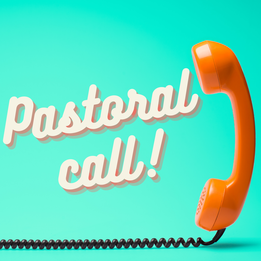|
3LQ? No, the dog didn't accidentally hit the keyboard as I was typing. "3LQ" stands for "Three Leadership Questions". 3LQ is designed for new or seasoned leaders who want to lead in a way that glorifies God, impacts His Kingdom, and reinforces the family unit. Each month you will hear from leaders who will share valuable insight into leadership - leading yourself and leading others. Starting May 2021, I will be presenting different leaders each month who will answer three questions on a variety of topics: Productivity, Leadership, Time Management, and more. You'll hear from Pastors, Ministry Leaders, Corporate CEO's, Marketing specialists, and more. Sign up below to be the first to receive updates when a new 3LQ is released.
0 Comments
Preparing the finishing touches on your Sunday sermon, the notification on your smartphone alerts you. While you assume the message is from a friend, you casually glance at the text message that begins with the words, “Our dear mother has passed away.” The finishing touches of your Sunday sermon now on hold, you immediately call the family member. You realize the King of Kings and Lord of Lords has invited you to shepherd this precious family through difficult days ahead. Prayer, Biblical counseling, and Christian resources dealing with grief are all important ways to shepherd a family who have suffered a loss. Yet another aspect of shepherding remains: Leading the funeral service. What should you do when you're called upon to shepherd a family during a funeral service? I have provided a ten step guide below to offer assistance to you the next time you’re called upon to lead a funeral service.
For a customizable funeral service template and a graveside service template to provide assistance to you as you lead others during a funeral service, provide your name and email address below. I will send free resources to your inbox that will assist you during your next funeral service. A good shepherd will care for the sheep by spending time with the sheep. Jesus said in John 10:14 (ESV), “I am the good shepherd. I know my own and my own know me...” Our good shepherd is with us always and promised never to leave us. Yet pastors are called to “shepherd the flock of God (First Peter 5:2),” and part of that call is to spend time with God’s flock.
Pastors realize early on in ministry they are not omnipresent, but their love for God’s flock does not cease when they cannot gather. So, pastors pray. Pastors schedule time to lift God’s flock by name to the Chief Shepherd. The pastor will also set aside time to make a pastoral phone call to the member(s) who cannot gather physically with the rest of the flock. While the phone call does not replace the physical presence of the pastor, the phone call can be spiritually edifying for the flock of God. Most often, once you begin with an opening question, the conversation will flow. However, should there be a lull in the conversation, here are ten straightforward questions that can open the door for purposeful discussion.
What are some helpful questions you fall back on when you make pastoral calls to those whom God has called you to lead? Leave your comments below to serve other leaders in the ministry. Simply looking at my smartphone screen can open up a world of possibilities. My smartphone can recognize my facial features and react by opening the device. Then send an email, text message, DM, tweet, and more. My smartphone device has many excellent productive and communicative features that I use daily.
On the other hand, using a screen and keyboard is not the only way I communicate with those God has called me to lead. There are alternative methods of communication without using technology. Most often, I aim to encourage others without using technology, and there is an assortment of ways you can encourage those you lead without using technology. I have listed ten ways to encourage someone without using technology below. While we can use technology to communicate with one another, communicating with one another does not always have to be in the form of technology. Read through the list and add to the list by sharing the various ways you communicate with those you lead.
"United we stand, divided we fall." Each election season that comes upon us in the United States of America, I always feel blessed that we live in a country that we have the freedom to vote. I also feel gratitude thinking about friends, family, and others who bravely fought for the freedoms we do have in the U.S.A. Yet, each election season also brings a sense of division. It often comes down to: Right vs. Left; Conservative vs. Liberal; Republican vs. Democrat. In this election season, the perception of the disunity is greater than ever. While we watch the disunity during political debates, you may have also noticed the disunity on social media platforms between those whom you are called to lead. "United we stand, divided we fall" is not just a quote for our wonderful country - it's also an adage for those whom you lead. How should you lead during the division? How can you lead your team (paid or volunteers) toward unity? Standing in unity begins by standing together on our knees and it begins with you - the leader. Colossians 4:2 says, "Continue steadfastly in prayer..." To continue steadfastly in something doesn't mean you continue in something when it's easy and back off when the 'going gets tough'. Leadership is difficult and leading during a time of division calls for strength and perseverance. Leading during division calls for strong leadership. Leadership during division calls for leaders to continue steadfastly in prayer. "United we stand, divided we fall" is a wonderful slogan for our country, but it's also a rally cry for leaders to be united in prayer for those whom we lead. Leaders in churches, leaders in the classroom, leaders in the home, leaders in the factory, leaders in the field, leaders in ministry, are called to be united together in prayer. Leaders are called to pray for those whom we lead, for those who are in authority, and for those seeking an elected office. Leadership in Ministry wants to provide you with a free seven day prayer guide. This prayer guide will guide you over the next seven days in how you can pray for those you lead, for those in authority, and for those seeking an elected office. Each day gives you a guide for your time of prayer along with Biblical support. Will you commit to seven days of prayer for those you lead? Will you also commit to seven days of prayer for this election season as well? If you will commit, fill out the form below. By filling out the form below, you will gain access to our seven day prayer guide and also will be included in our monthly "Leadership in Ministry: Inside Look": a newsletter looking at leadership in ministry. |
Archives
March 2023
This website uses marketing and tracking technologies. Opting out of this will opt you out of all cookies, except for those needed to run the website. Note that some products may not work as well without tracking cookies. Opt Out of Cookies |




